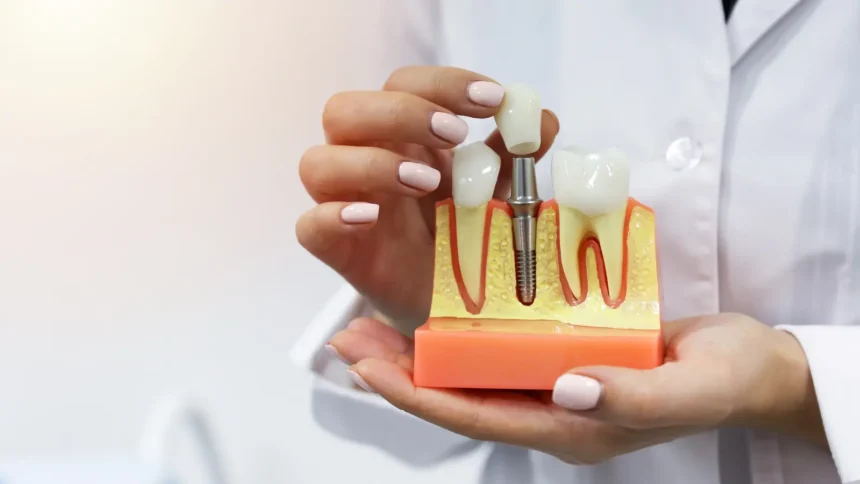If you’re living with diabetes and considering dental implants, you’re probably wondering whether this popular tooth replacement option is safe for you. The good news is that dental implants can be a viable solution for diabetics, though there are important considerations to keep in mind.
Diabetes affects millions of Americans, and many face unique challenges when it comes to oral health and dental procedures. Poor blood sugar control can impact healing, increase infection risk, and complicate dental treatments. However, with proper management and the right approach, diabetics can successfully receive dental implants and enjoy their long-term benefits.
This comprehensive guide will explore the relationship between diabetes and dental implants, helping you understand the risks, requirements, and steps you can take to ensure a successful outcome.
Understanding Diabetes and Oral Health
Diabetes significantly impacts oral health in several ways. High blood sugar levels create an environment where harmful bacteria thrive, leading to increased risk of gum disease, tooth decay, and infections. Additionally, diabetes can slow wound healing and reduce the body’s ability to fight off infections.
For diabetics, these oral health challenges make tooth loss more common. When teeth are lost due to decay or gum disease, dental implants often represent the best replacement option. Unlike dentures or bridges, implants provide a permanent, stable foundation that won’t slip or cause discomfort while eating or speaking.
However, the same factors that contribute to tooth loss in diabetics also create potential complications for implant procedures. Understanding these risks is crucial for making an informed decision about your dental care.
Dental Implant Safety for Diabetics
The short answer is yes—dental implants can be safe for diabetics. However, success depends largely on how well your diabetes is controlled and your overall health status.
Blood Sugar Control is Critical
The most important factor determining implant success is glycemic control. Patients with well-controlled diabetes (typically an HbA1c level below 7%) generally have success rates similar to non-diabetic patients. Poor blood sugar control significantly increases the risk of complications, including:
- Delayed healing around the implant site
- Increased risk of infection
- Poor osseointegration (the process where the implant fuses with the jawbone)
- Higher likelihood of implant failure
Type 1 vs Type 2 Diabetes
Both Type 1 and Type 2 diabetics can receive dental implants, though the approach may differ slightly. Type 1 diabetics often require more careful monitoring during the healing process, while Type 2 diabetics may need to focus on weight management and medication compliance before the procedure.
Factors That Affect Implant Success
Several factors influence whether dental implants will be successful for diabetic patients:
Current Blood Sugar Levels
Your dentist will typically require recent blood work showing your HbA1c levels. This test measures average blood sugar over the past 2-3 months and provides insight into how well your diabetes is managed.
Overall Health Status
Other health conditions common in diabetics, such as cardiovascular disease or kidney problems, may impact implant candidacy. Your dental team will coordinate with your physician to ensure you’re healthy enough for the procedure.
Bone Quality and Quantity
Diabetes can affect bone density and quality, which are crucial for implant success. Your dentist may need to perform additional imaging or bone grafting procedures to ensure adequate support for the implant.
Smoking Status
Smoking dramatically increases implant failure rates, particularly in diabetics. If you smoke, quitting before implant placement is essential for success.
Pre-Procedure Preparation
Proper preparation is key to successful implant placement for diabetic patients. Your dental team will work closely with you to optimize conditions for healing and success.
Medical Clearance
You’ll likely need clearance from your physician or endocrinologist before proceeding. This ensures your diabetes is well-controlled and you’re healthy enough for surgery.
Optimizing Blood Sugar Control
If your diabetes isn’t well-controlled, your dentist may recommend postponing the procedure until your blood sugar levels stabilize. This might involve adjusting medications, improving diet, or increasing exercise.
Antibiotic Prophylaxis
Many diabetic patients receive antibiotics before and after implant placement to reduce infection risk. Your dentist will determine if this is appropriate based on your specific situation.
The Implant Procedure for Diabetics
The actual implant procedure for diabetics is similar to that for non-diabetic patients, with some modifications to account for diabetes-related considerations.
Enhanced Monitoring
Your dental team will monitor you more closely during and after the procedure, checking for signs of complications or delayed healing.
Modified Healing Timeline
Diabetics may require longer healing periods between implant placement and crown attachment. While non-diabetics typically wait 3-6 months, diabetics might need 4-8 months for proper osseointegration.
Blood Sugar Management
Maintaining stable blood sugar levels during the healing period is crucial. Your dentist may coordinate with your physician to adjust medications or dietary recommendations as needed.
Post-Procedure Care and Monitoring
Recovery requires diligent care and monitoring to ensure successful healing and long-term implant success.
Strict Oral Hygiene
Maintaining excellent oral hygiene is even more critical for diabetics. This includes regular brushing, flossing, and using antimicrobial mouth rinses as recommended by your dentist.
Regular Follow-Up Appointments
You’ll need more frequent follow-up visits to monitor healing progress and catch any potential problems early. These appointments are essential for long-term success.
Ongoing Blood Sugar Management
Continue working with your healthcare team to maintain optimal blood sugar control throughout the healing process and beyond.
Long-Term Success and Maintenance
With proper care and management, dental implants can last decades for diabetic patients. However, ongoing maintenance is crucial for success.
Professional Cleanings
Regular professional cleanings every 3-4 months (rather than the typical 6 months) help prevent peri-implantitis, a serious condition that can lead to implant failure.
Home Care Routine
Daily care should include brushing twice daily with a soft-bristled toothbrush, flossing around implants with special floss or tools, and using antimicrobial mouth rinse.
Regular Monitoring
Annual or bi-annual X-rays help detect any problems early, when they’re most treatable.
Alternative Options
If dental implants aren’t suitable for your situation, several alternatives exist:
- Dentures: Removable options that can be more affordable but may be less comfortable
- Bridges: Fixed options that rely on adjacent teeth for support
- Mini implants: Smaller implants that may be suitable for patients with less bone density
Making the Right Decision for Your Health
Deciding whether dental implants are right for you as a diabetic requires careful consideration of multiple factors. The key is working with a dental team experienced in treating diabetic patients and maintaining open communication with your healthcare providers.
If your diabetes is well-controlled and you’re committed to excellent oral hygiene and regular follow-up care, dental implants can provide a stable, long-lasting solution for missing teeth. However, if your blood sugar levels are poorly controlled or you have other significant health concerns, it may be better to focus on improving your overall health before pursuing implants.
Remember that every case is unique. What works for one diabetic patient may not be appropriate for another. A thorough evaluation by your dental team, in consultation with your physician, will help determine the best approach for your specific situation.
Take the first step by scheduling a consultation with a dentist experienced in treating diabetic patients. They can assess your individual risk factors and help you make an informed decision about whether dental implants are the right choice for restoring your smile and improving your quality of life.









